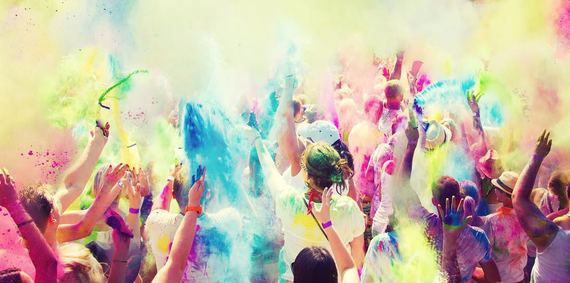Colors play an important role in our lives. We always decide which color to choose no matter whether we are buying some clothes or painting the walls of the rooms. It's important as the choice of the color can often influence our mood. Depending on the color choices of the walls, buildings, surrounding living areas, we might feel either comfortable and relaxed or annoyed. But do our feelings of comfort or distress depend only on us or are taken for granted within a certain cultural background?
Psychologists have studied the properties of colors to understand the influences of a color on humans' psyche, the positive and negative aspects of each color. But, of course, it's not a ready-made formula for everyone. It's very individual, and before jumping to some conclusions, each professional psychologist should ask a person what this or that specific color means to him or her. Colors can be used in art therapy as one of the elements of spotting the problematic zones in a person's psychological health and general well-being. But one should be very careful with making final conclusions as colors also carry a lot of prejudices, and so it gets easy to jump to wrong conclusions. And I've always wondered why we have so many judgments regarding the color scheme and tend to make immediate conclusions about a person based on his or her choice of the color.
When I started doing my art, a lot of people said it was too dark and started asking all the type of questions whether or not I had some trauma and why it's so dark, etc. But when I produce art and use some darker color scheme in my works, I don't view black as a depressing color or the color of mourning (which is commonly used in a lot of countries), but rather as a color of mystery, secrets, magic, as something which is not fully revealed and completely understood. Black color for me is a color of elegance and sophistication, a color that gives room for imagination. For me, black color is one of the best colors as there is so much mystery and refinement associated with it. And I use black not only in my art but in the choice of clothing as well. I feel that it's a reflection of my personality and use it quite often. But all the time I get asked such questions: Has somebody died in your family? Why black color? Are you part of the Goth subculture? etc. I am not part of the Goth subculture, and I am not depressed, -- black is just a color that best fits my personality, and I view it as a very positive color. Being asked such questions, I've realized how many prejudices we have regarding the color. You are wearing bright colors -- you are a happy person, you wear red -- you want all the attention on you, and you are provocative, you wear black -- you are sad or depressed. But it's not as simple as that. We just got used so much to viewing the color as a connotation of some features without realizing that we fall into a narrow mindset and follow already created 'rules' without trying to dive deeper into the subject. We have a predetermined color scheme for every event, and it's not necessarily the color scheme we would like to use. It has become common to get married in a white dress, to buy pink clothes for baby girls and blue for baby boys, and so on. But I think it's a time to break away from all these prejudices and become freer in our choices.
Luckily, there is already a move to introducing a different color scheme into such an important event as a wedding, which is a starting point to break away from prejudices. Traditionally, weddings have a predetermined color palette. The bride is supposed to wear only a white dress (with probably some little color added), the bouquet is also supposed to be white, either with white roses, gardenias or lilies of the valley. At times pink or light blue is added to dilute the whiteness. The tables are served with white table clothes, with a slight adding of another color. It's a nice tradition to have a predominantly white color palette when getting married as while color is traditionally considered to have the symbolic meaning of purity, innocence, and completion. But it's only good when a person who is getting married loves white color. But what about the people who don't feel like white color is the one that reflects their personality, feelings, and mood. And so these days top designers try to take into consideration each individuality, each taste for a different color and introduce new types of wedding dresses. One can now view and choose black wedding dresses, which is perfect for the people who don't feel like wearing a traditional white dress. The wedding is one of the most important events in life as it symbolizes a new beginning, a new stage in life, and that's why it is important to feel oneself comfortable on that special day. In the long run, all that matters is to express one's uniqueness and not to fall into the prejudices, as they limit the freedom of individuality.
There are no 'good' or 'bad' colors; all the colors are great and express different things for different people. No matter whether you make art, paint your walls or buy a dress, -- choose the colors that best express your personality, but not the colors you are supposed to use. If you don't want to get married in a white dress, -- don't do it; if you like the white color, -- go for it. It's all about the individuality and freedom of expression.

